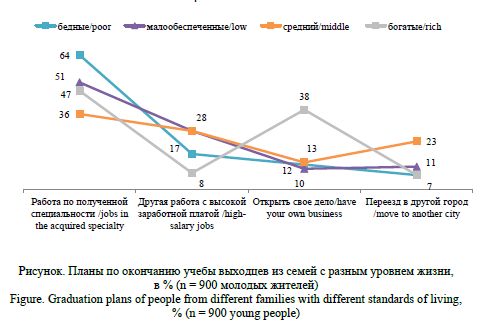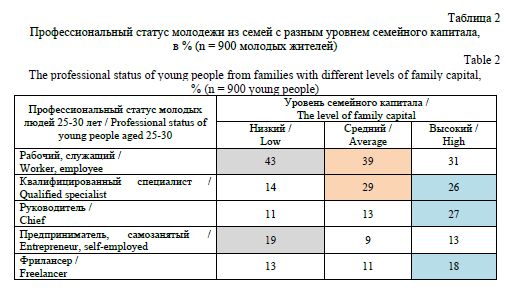Family capital as a factor in the professional development of young Russians
The topic is relevant in light of the evolving role of the family as a social institution and as a small group in influencing the younger generation of Russians. The economic modernisation of Russian society, the acceleration of the pace of introduction of new technologies, the expansion of the information space in the era of universal digitalisation, and the reduction of direct communication with relatives have collectively resulted in a decline in the efficacy of family strategies designed to maintain the socio-professional success of young people. It is crucial to highlight the role of the parent family in the professional development of children, particularly during the crucial stages of career choice and job search after graduation and the completion of vocational training, respectively. The issue arises from the fact that, on the one hand, the transformation of the social conditions of family functioning has led to the integration of specific families into virtual communications and global and national spaces. Conversely, the family institution and its members continue to fulfil the preceding functions of socialisation, education, and psychological and economic support for young people. The successful realisation of these functions is contingent upon the utilisation of the total family capital. The objective of this article is to elucidate the concept of "family capital" and ascertain the extent to which its constituent elements exert an influence on the professional development of the younger generation of Russians. In order to achieve this objective, a theoretical analysis was conducted to ascertain the nature of family capital, its economic, cultural, and human components were delineated, and the distinctive manner in which family capital components exert influence on the practices and outcomes of professional development among young people was highlighted. The article presents findings that are of significant scientific importance. These include the definition of family capital, the structure of its components, and the dynamics of changes in the economic, human, and cultural components of family capital as Russian society undergoes transformation. Additionally, the degree of participation of the family capital of parents in the employment and professional adaptation of children is examined. The following conclusions may be drawn: the concept of family capital, which encompasses economic, cultural, and human resources within the nuclear and extended family unit, serves as a foundational element in the stable functioning of parents and children. However, it is subject to constant change due to the ongoing transformation of society. The scale and activity of family capital are contingent upon the type of settlement, the composition of the family, and the professional, economic, and cultural activities of parents. The author's research has enabled the establishment of the following findings: the economic component of family capital is the most vulnerable; in a typical family in the Russian hinterland, it corresponds to the average level, is supported by an active social policy of the state, inflation control, and differentiation of financial instruments. The cultural and human components of the capital of typical families are above average; this is influenced by an increase in the educational level of the population, active higher education by female mothers, and an increase in the share of "friendly" families as the human capital of parents increases. The following factors have been identified as potential risks to family capital: excessive employment of parents outside the family unit, a reluctance to invest financial resources in the education of family members, a low proportion of families adhering to educational leisure, and the high virtualisation of communication and creativity within the family.
Figures


Shinyaeva O. V., Kamanina V. E. (2024), “Family capital as a factor in the professional development of young Russians”, Research Result. Sociology and Management, 10 (4), 192-206. DOI: 10.18413/2408-9338-2024-10-4-1-0


















While nobody left any comments to this publication.
You can be first.
Antonenko, V. V. and Antonov, G. V. (2015), “Assessment of the total volume of family investments in the key elements of the human capital of the youth of modern Russia”, Jekonomicheskij analiz: teorija i praktika, (25),
32-42. (In Russian)
Beginina, I. A. and Ivchenkov, S. G. and Shakhmatova, N. V. (2014), “Family values among young people: factor analysis of the results of a sociological study”, Sociologicheskaja nauka i social'naja praktika, (2), 116-136. (In Russian)
Burkhanova, F. B. and Galyautdinova, S. I. and Algushaeva, V. R. (2017), “Socialization and upbringing in the modern Russian family: changes and challenges”, Aktual'nye voprosy jekologii cheloveka: social'nye aspekty: sbornik nauchnyh statej, (1), 111-121. (In Russian)
Dementeva, I. F. (2014), “Transformation of value orientations in the modern Russian family”, RUDN Journal of Sociology, (6-7), 150-160. (In Russian)
Dobrokhleb, V. G. and Kondakova, N. A. (2019), “The role of family capital in the development of professional careers of social workers”, Problemy razvitija territorii, 6 (92), 94-107. (In Russian)
Kukanova, Ye. (2015), “The role of family capital in the development of professional careers of social workers”, Gumanitarnye nauki i obrazovanie, 4 (24), 67-73. (In Russian)
Koulman, Dzh. (2001), “Capital social and human”, Obshhestvennye nauki i sovremennost', (3), 121-139. (In Russian)
Radaev, V. V. (2003), “The concept of capital, forms of capital and their conversion”, Obshhestvennye nauki i sovremennost', (2), 5-16. (In Russian)
Roshchina, Ya. M. (2012), “Family capital as a factor of educational opportunities for Russian schoolchildren”, Voprosy obrazovanija, (1),
257-277. (In Russian)
Strokova, S.S. (2017), “The connection of family image and family identity with the emotional well-being of adolescents”, Klinicheskaja i special'naja psihologija, (1), 119-137. (In Russian)
Seliverstova, N. A. and Zubok, Yu. A (2023), “Student youth perceptions of the meanings of education: socio-cultural features of self-regulation”, Sociologicheskaja nauka i social'naja praktika, 11 (1), 44-69. (In Russian)
Ushkova, Yu. V. and Shinyaeva, O. V. (2018), “Family capital and its dependence on the social characteristics of families”, Izvestija vysshih uchebnyh zavedenij. Povolzhskij region. Obshhestvennye nauki, (1), 124-137. (In Russian)
Shkaratan, O. I. (2016), “Sociocultural continuity in the Russian family: (empirical research experience)”, Obshhestvennye nauki i sovremennost', (1), 5-27. (In Russian)
Goldthorpe, J. (2002), Occupational Sociology, Yes: Class Analysis, No: Commenton Grusky and Weeden’s Research Agenda, Acta Sociologica, 3 (45), 209-217.